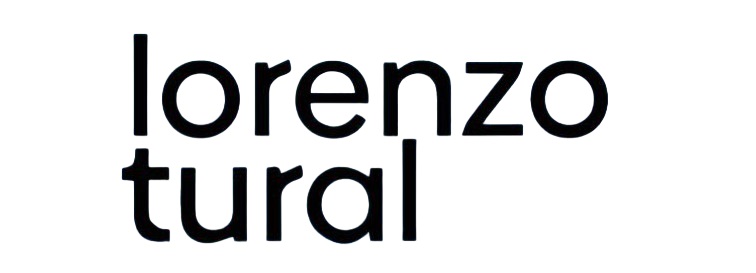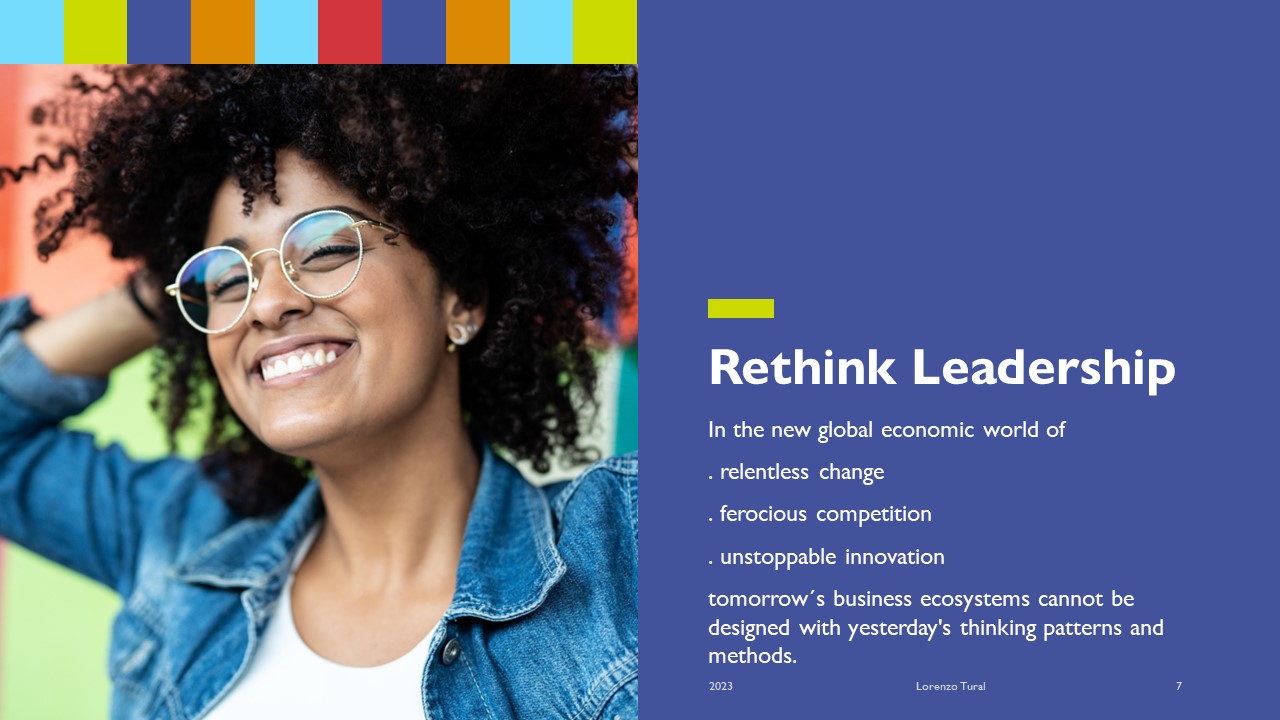
Companies in the new global economic system are those that have a culture that enables them to learn fast from their environment and adapt to it so they can take advantage of volatility.
In the organizational map of companies there are all four types of organizations:
» Fragile organizations, which are immediately unable to cope with a shock.They avoid the mess and are susceptibile to disorder.
» Brittle organizations, which carry on for a while but ultimately fail.
» Resilient organizations, which experience a dip resulting from the shock but which ultimately return to the same level of performance as before.
» Antifragile organizations, which not only survive a shock, but become stronger through it.They gain from Disorder.
Leadership challenge in the new global economic system is to steer the company towards the entrepreneurial purpose with such a map.
To underpin the importance of antifragility, we call the modern leadership of the future >>> Antifragile Leadership.
Contact: +49 (0)1590 1497679
Our Consulting Services
- Introduction to real world beyond fragility
- Building an antifragile organization based on the agile triplet Antifragility - Robustness - Fragility
- Rethinking and reconfiguring the workforce
- Composing an antifragile infrastructure
- Rethinking and managing business continuity
- Rethinking the ethics of fragiliy and antifragility from your company's point of view
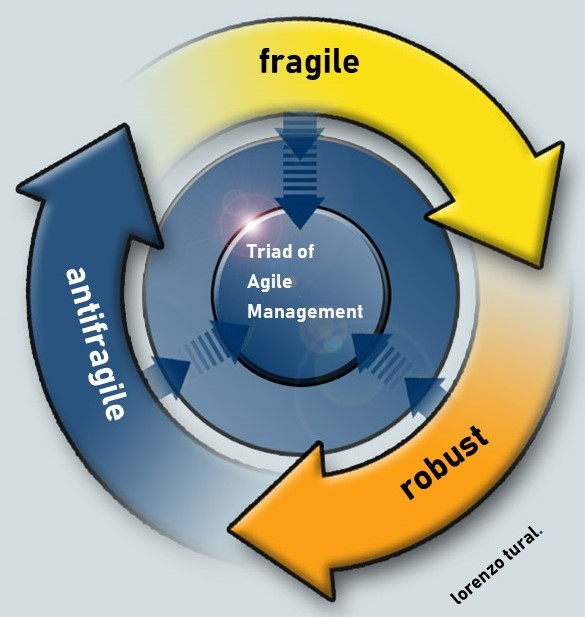
Triad: The agile triplet Antifragility - Resilience (Robustness) - Fragility
Half of life -the interesting half of life- we dont have a name for: the antifragile half!
The term “antifragility,” coined by Nassim Nicholas Taleb in his book
Antifragile: Things That Gain from Disorder,
is defined by the source of its strength.
Like the human body, whose immune system gets stronger from exposure to germs and diseases, the antifragile system improves or responds positively when shocked.
While fragile systems are easily injured and suffer from volatility, antifragile systems grow stronger in response to volatility. So-called robust systems remain unchanged.
The fragile are susceptible to large lethal shocks.
The resilient (robust) can handle adversity but stay the same.
The antifragile grow and improve (evolve) from external shocks.
The agile move and adapt rapidly ... see also AGIL Schema für Agiles Management
Our Antifragile Leadership Terminology (Excerpt)
Falsifikation (auch Falsifizierung)
Culture of Antifragility
Fundamental Asymmetry (Seneca´s Asymmetry)
Fat-tailed risk
Thin-tailed risk
Heuristics, Biases, and Noise
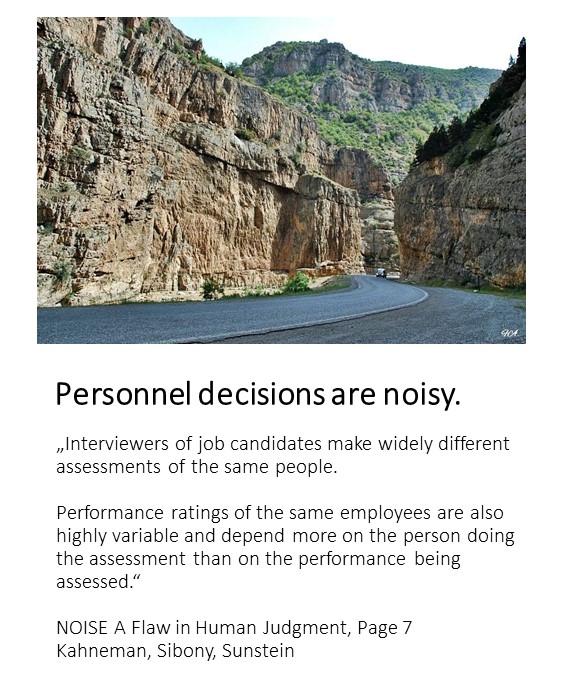
Fragilista (Someone who causes fragility because of his naive rationalism. Also usually lacks sense of humor. Often fragilistas fragilize by depriving variability-loving systems of variability and error-loving systems of errors.)
Lecturing-Birds-How-to-Fly Effect (inverting the arrow of knowledge academia -> practice, or education -> wealth)
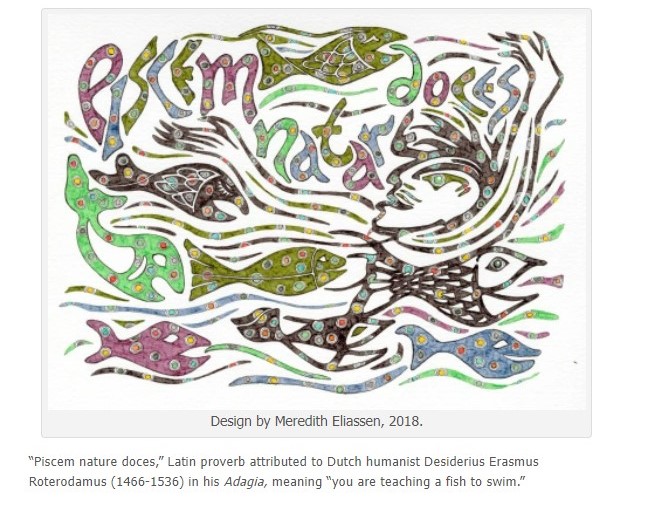

Touristification
(Rational) Flaneur
Tantalized Class
Naturalistic Risk Management
Burden of Evidence (Beweislast)
Ludic Fallacy (Ludische Verzerrung)
Uncertainty of Nerds (Unsicherheit von Nerds z.B. von Techies oder Tekkies)
Antifragile Tinkering, Bricolage (Antifragiles Tüfteln)
Hormesis (when a bit of a harmful substance, or stressor, in the right dose or with the right intensity, stimulates the organism and makes it better, stronger, healthier, and prepared for a stronger dose the next exposure, think of bones and karate!)
Naive Interventionism (Intervention with disregard to iatrogenics. The preference, even obligation, to “do something” over doing nothing. While this instinct can be beneficial in emergency rooms or ancestral environments, it hurts; in others in which there is an “expert problem")
Naive Rationalism
Turkey and Inverse Turkey -Truthahn, umgekehrter Truthahn
(The turkey is fed by the butcher for a thousand days, and every day the turkey pronounces that the butcher “will never hurt it” with increased statistical confidence - until thanksgivings when it is a “Black Swan” revision of belief for the turkey.
The inverse turkey is the mirror confusion, not seeing opportunities - pronouncing that one has evidence that someone digging for gold or searching for cures will “never find” anything.)
Doxastic Commitment or Soul in the Game
Heuristics
Opaque Heuristic
Agency Problem
Hammurabi Risk Management
Green Lumber Fallacy (Grünholztäuschung)
Skin in the Game
Empedocles´ Tile
Cherry-Picking
Ethical Problems as Transfers of Asymmetry (Fragility)
Rational Optionality
Ethical Inversion
Narrative Fallacy (Narrative Verzerrung)
Narrative Discipline
Non-narrative Action
Robust Narrative
Subtractive Knowledge (Subtraktive Prophezeiung)
Via negativa
Subtractive Prophecy
Neomania
Opacity
Mediocristan
Extremistan
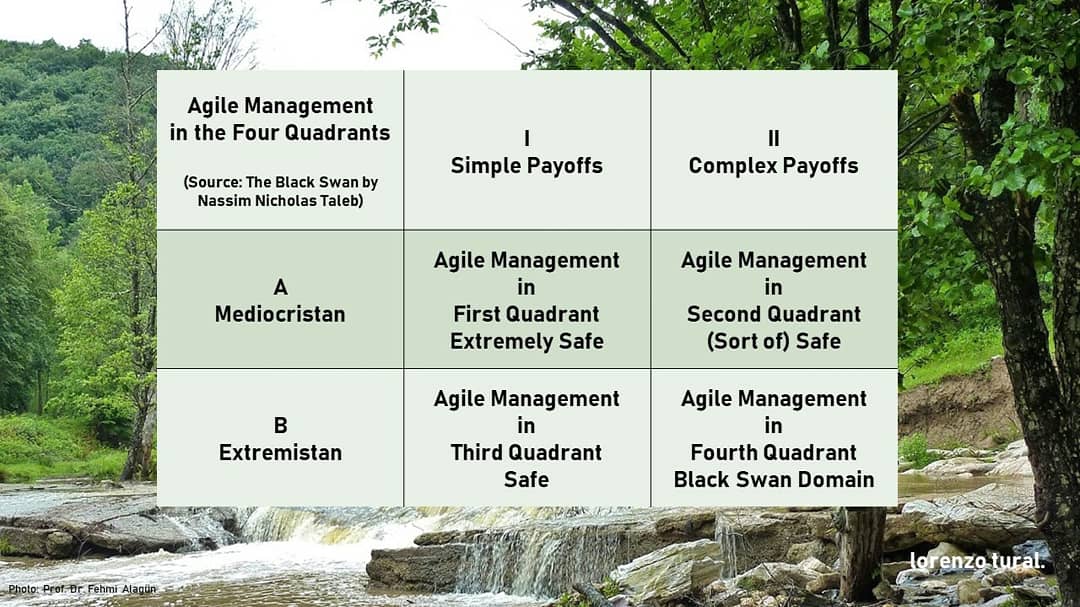
Nonlinearities, Convexity Effects (smiles and frowns) Philosopher´s Stone (Convexity Bias)
Rent Seeking
Revelation of Preferences (Aufdeckung von Präferenzen)
Regulatory Capture (Ausnutzen von Regulierungsmanahmen)
Scientism vs. Science
Interventionista
Minority Rule
Scalability
Intellectual Monoculture
Prinzip der Barmherzigkeit
Golden Rule (Symmetry)
Silver Rule (negativ formulierte Goldene Regel)
Probability Blindness
Probability, the Child of Skepticism
Wittgenstein´s Ruler
Just a liitle more about Rethinking Agile Leadership: Competencies for Mastering Complexity
